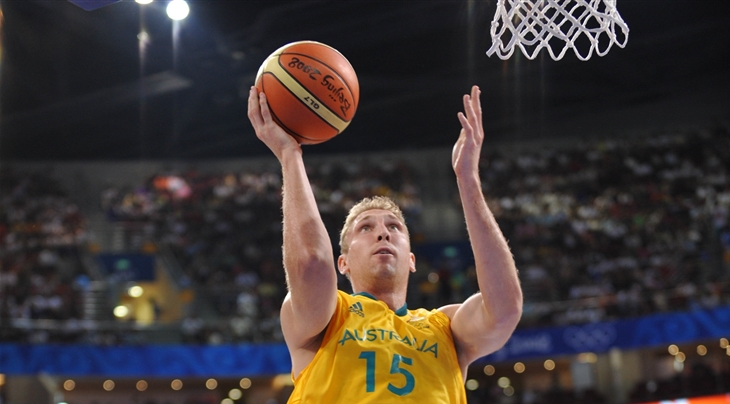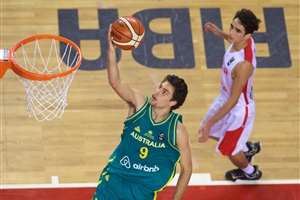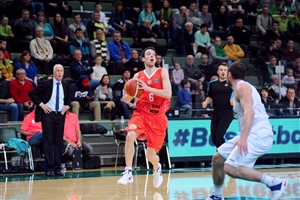
Ready for the next challenge
MELBOURNE (Paulo Kennedy's View from Downunder) - "It's hard to imagine rocking up to a Wildcats weights session or getting ready to hit the court without the great man, Shawn Redhage. But that's how it's going to be next season after he announced his retirement this week".
Those were the words of long-time Redhage teammate Greg Hire in his column for his local newspaper, the Joondalup Times, this week.
Thank you @Redhage42 #Redhage42 #ThankYouShawn #AllTimeGreats pic.twitter.com/0ZcLZdneHa
— Greg Hire (@greg4hire) January 30, 2017
Sadly, just a few days after his Beijing Olympics teammate Mark Worthington announced he would hang up the boots at season’s end, Redhage has done likewise.
While many will remember him as one of the bad guys due to his incredibly competitive nature - and the fact he would do almost anything to win - once the dust settles Redhage will be viewed as one of the greats of the modern era Downunder.
Props to @Redhage42 who becomes the 2nd most capped @PerthWildcats player overtaking James Crawford with game number 472 #NBL17 #YourGame pic.twitter.com/O7Dysbh3QY
— NBL (@NBL) February 3, 2017
At a time when few were paying attention to elite basketball in Australia, Redhage was one of a small number of players revolutionising the NBL game.
While the NBA's switch to mobile power forwards has received much publicity, then-Perth Wildcats coach Rob Beveridge switched career small forward Redhage to that role in 2009-10 and he helped lead them to a championship.
What made him so special in that role was his incredible fitness and appetite for work. When I was given access to the Wildcats’ inner sanctum two years later, I was amazed to find out that Redhage's heartrate almost never dropped below 180 while he was on the court, such was his workrate.
Perth's strength and conditioning staff likened him to an elite triathlete with his ability to exercise at a high intensity for long periods of time. On court that translated to running the floor hard on offence, moving constantly without the ball and crashing the offensive glass.
Defensively, it meant an ability to deny the inbounds, double team the ball-handler, recover to his man, crash the d-boards before haring off down the other end once the ball was secured. The role Redhage played became a template for success around the NBL.
Naturally, Damian Martin’s contribution to Perth’s league-best defence has been well discussed, but in the early days of Beveridge’s coaching reign Redhage was the next most important player due to his athletic capabilities and high IQ play.
Thanks @Redhage42 great memories in Quebradillas.. #piratas pic.twitter.com/J2UjejTfAe
— Ricardo (@Rickybasket11) January 30, 2017
Yet while Redhage's achievements are highly impressive - Olympian, three-time NBL champion, Wildcats 30-year team member, six-time Perth MVP, championship winner and club legend at Quebradillas in Puerto Rico - what he has contributed off the court has been just as important.
Hire wrote in his tribute that "he took me under his wing, showing me what it took to be a professional athlete".
Hire added: "He showed me how to be a leader; that you make the most of your talents through sheer hard work. He showed me how to get the most out of your body and that your mind can achieve incredible things when your back’s against the wall."
That was six-to-seven seasons ago when Hire was a development player with the 'Cats, but his words match up with how Martin last week described Redhage’s impact on the club’s current crop of youngsters.
"There's a lot of couch commentators and there's been a lot aimed at his direction this year, but what people don't see is the professionalism he brings to training every single day," Martin said.
"He's making the younger guys better players, better athletes and turning them into pros, and he’s only getting judged for the few minutes he plays sporadically on game night."
But even at age 32, now an Olympian and three-time NBL champion himself, Martin revealed Redhage still plays a valuable role as mentor, tutor and advisor to help steer the Wildcats' ship.
"Even on the sideline when he's not playing he's the first person to pull you aside and say look at this option, look at that, look at running this," Martin said.
"He's always in the game mentally, it's just sometimes he doesn't get out there for as long as he'd like, but he's always ready to go."
What Redhage is perhaps most admired for, is not that he passed James Crawford into second place on the Wildcats' games player list on Friday with game 372, but what he had to overcome to get there.
First there was the fact he arrived in Australia and had to earn his stripes in the lower leagues before earning an opportunity in the NBL, long before he became a star, an Aussie citizen and a Boomer, but then there was the injury.
Strongest @Redhage42 memory is comeback from hip surgery. Saw him in hospital, never thought I'd see him play again https://t.co/BpZ3WAxw6O
— Jacob Holmes (@jacobholmes12) January 30, 2017
Many thought Redhage would never play again after destroying his hip joint in an awkward fall in Adelaide, an injury that would require surgery and weeks of treatment and rehab in the USA.
Not only did he manage that through sheer will and determination, but just over two years after his return he was a significant piece in Perth’s sixth championship win, averaging 13.6 points, 4.5 boards and 2.6 assists per game, while shooting 48 per cent from the field, 39 per cent from the stripe.
Hire summed it up well when he wrote "doctors told him it was unlikely he would return to his former ability or even make a comeback, but he definitely showed them".
The Wildcats currently sit in third place with just 10 games remaining before the NBL playoffs. Their back-to-back dream is still alive, and title number four would be an incredible way to send Redhage off and cement him as an all-time great as he sets sail for a new life with his family.
Shawn Redhage's biggest fans were on deck for his retirement announcement today! 👨👩👧👦 pic.twitter.com/lyjnXHy65p
— Perth Wildcats (@PerthWildcats) January 30, 2017
Paulo Kennedy
FIBA
FIBA's columnists write on a wide range of topics relating to basketball that are of interest to them. The opinions they express are their own and in no way reflect those of FIBA.
FIBA takes no responsibility and gives no guarantees, warranties or representations, implied or otherwise, for the content or accuracy of the content and opinion expressed in the above article.

















